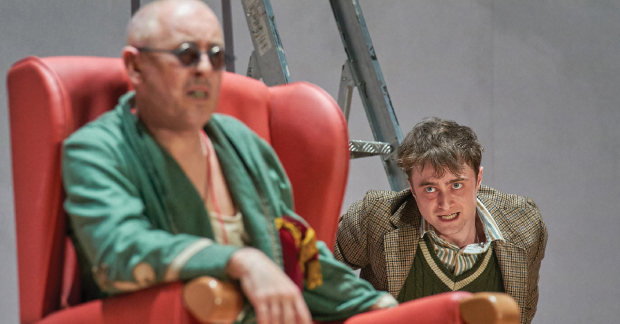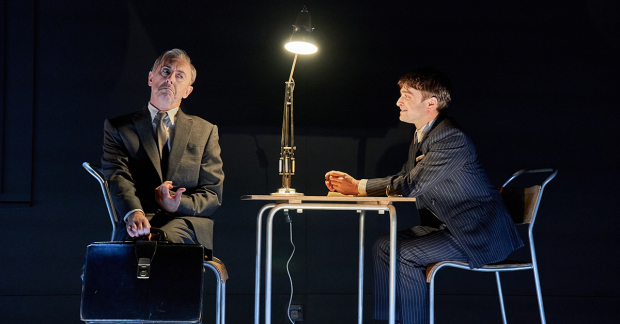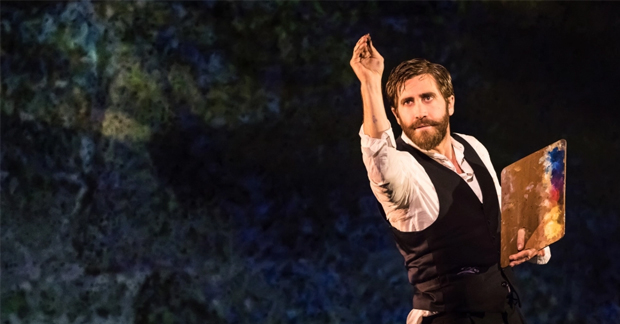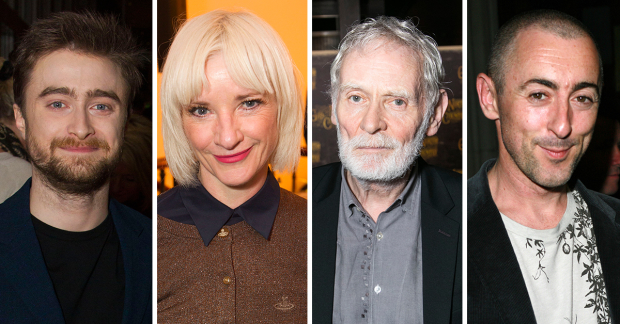Review: Endgame (The Old Vic)

© Manuel Harlan
Frankly, I have a bit of a problem with the plays of Samuel Beckett. I love the monologues, all those people sitting in pools of light in darkened rooms repetitively remembering the past. But the plays – those strange structures where vaudevillian characters repeat patterns of behaviour which reveal the emptiness of the universe and the bleakness of their souls – I tend to like in theory, but struggle with, in practice.
There is something so airless and nullifying about them, however clever they are. I know that's the point, but there you go. So, what I loved about Richard Jones' assured production of Endgame is that he is prepared to dispense with many of the Beckett clichés while remaining true to the author's intent.
Gone are the dark walls and crepuscular lighting. Alan Cumming's Hamm and Daniel Radcliffe's Clov are trapped in a room with high windows, but the walls of Stewart Laing's set are a delicate mauve and Adam Silverman's lighting moves in depressing flatness rather than deep shadows. Clov is rather dapper in a waistcoat and bow tie; Hamm is a skinhead with stick-thin legs propped uselessly in front of him. Hamm's mother and father – Nagg and Nell – emerge from wheelie bins not the traditional dustbin.
We are here and now, living Beckett's succession of "bloody awful days", as Hamm sits perched on a throne-like chair in a world where everything is running out and dispenses his solipsistic, cruel words. In Jones' conception and Cumming's unusually graceful performance, Hamm is a player, a performer, warming up for his final soliloquy, shooting his elegant fingers wide to make a point, gesturing elaborately to indicate his boredom. "Me to play," he constantly remarks, filling the short phrase with a remarkable variety of feelings.
But there's no mistaking his despair. "You're on earth, there's no cure for that." Cumming doesn't spit the words but drawls them like a pliant. It's an assured, profound reading and Radcliffe struggles effortfully to keep up, trying to find in Clov realistic reactions within the endless game he is forced every day to enact by his forbidding master.
What I admire about Radcliffe is his bold willingness to lead his multitudinous Harry Potter fans in interesting directions, plunging them into Beckett, just as he has previously explored Stoppard and Peter Shaffer. He could afford, however, to relax a little more, allow more play and less anxiety into this performance. He could, in fact, watch Karl Johnson who makes Nagg a figure of bewildered, tragic tenderness, aching with affection for Horrocks' almost unrecognisable Nell, telling his stories with a cavalier spirit as he attempts to bring light to the gloom.
In fact, one of the things Jones makes you notice is how much Endgame itself is about story-telling; the weaving of tales to hold off the dark, to assuage guilt, to understand a world that is running down to nothingness.
In this revival, it's paired with Rough for Theatre II, an absurdist piece that casts Cumming and Radcliffe as contrasting bureaucrats, called into a darkened room where a single motionless figure is about to jump from a window (hats off to Jackson Milner for a remarkable feat of endurance.) They weigh his words and statements witnesses have filed against him as they attempt to establish whether a single ray of hope illuminates his thinking and whether he can, therefore, be saved.
It's a slight piece, rarely performed but it does contain an immortal line – uttered with relish by Radcliffe – "He had his head in the oven when they came to tell him his wife had gone under the ambulance. Hell, he said, I can't miss that." It also allows the production team to create two fantastic coups de theatre, two worlds contained in boxes, two universes in which humans are ultimately tiny and isolated in the great scheme of things. Beckett, I think, would have approved.














